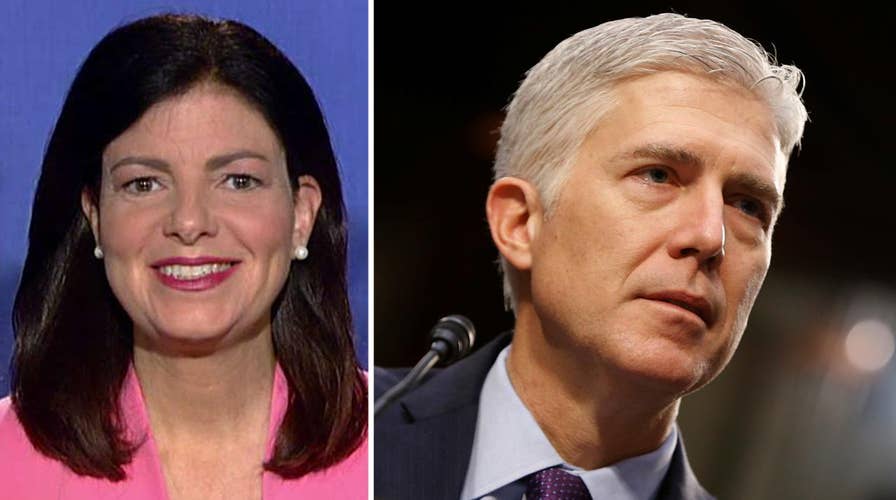Ayotte on going nuclear on Gorsuch: Dems left us no choice
Republican senator calls rules change 'unfortunate' but necessary
A Senate showdown is set for Thursday as Republicans prepare to go nuclear in their push to confirm President Trump’s pick for the Supreme Court as Democrats escalate their attacks on his selection.
Democrats have portrayed Judge Neil Gorsuch as an ally of the powerful and an enemy of the weak ahead of Thursday's key votes. Republicans are accusing Democrats of trying to block Gorsuch out of frustration over Trump's election victory.
"Democrats would filibuster Ruth Bader Ginsburg if President Donald Trump nominated her," said Majority Leader Mitch McConnell, R-Ky., naming one of the more liberal sitting justices. "There is simply no principled reason to oppose this exceptional, exceptional Supreme Court nominee."
The confrontation will play out as Democrats and independents try to block Gorsuch by denying Republicans the 60 votes needed to proceed to a final vote.
Republicans intend to respond by unilaterally changing Senate precedent to remove the 60-vote requirement for Gorsuch and all future Supreme Court nominees, reducing it to a simple majority. The maneuver is considered an extreme parliamentary move.
All 52 GOP senators are expected to vote to end the filibuster. Four Democratic senators will likely join them, which means Republicans are four votes shy of confirming Gorsuch outright.
It is not clear when Senate Republicans will deploy the nuclear option, but the process will likely begin an hour after the Senate meets.
Sen. Chuck Grassley, R-Iowa, told Fox News’ “The First 100 Days” Monday that “Gorsuch is going to be on the Supreme Court by midnight Friday night. I can assure you that. One way or the other, he’s going to get the necessary votes to get there."
Senate Majority Leader Mitch McConnell on Tuesday said Democrats have hit a “new low” in their obstruction. He still has said that he would employ the nuclear option and has filed a motion for cloture-- the first step in invoking the nuclear option.
The cloture vote is expected to fail and, at that point, McConnell is expected to attempt to change the precedent.
Here’s where things gets a little more confusing.
FiveThirtyEight.com reported that there will likely be four total votes: the initial cloture; the vote on the rule change; the cloture vote under the new rule; and finally the vote on Gorsuch.
McConnell is expected to vote against the cloture. His being on the prevailing side would mean that he could ask for a revote. Following the failed vote, the cloture vote would only require 51 yeas.
After the cloture vote, the Senate cannot extend matters by talking. At that point, McConnell can go nuclear. A final vote on Gorsuch is expected to take place Friday.
"For the first time in history, we are considering a nominee for a stolen Supreme Court seat, and that alone should be reason for everyone who cares about this institution to turn down this nominee," said Sen. Jeff Merkley, D-Ore., as he wrapped up a 15-and-a-half-hour overnight talk-a-thon to underscore his party's opposition to Gorsuch.





